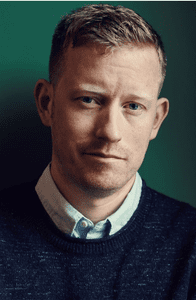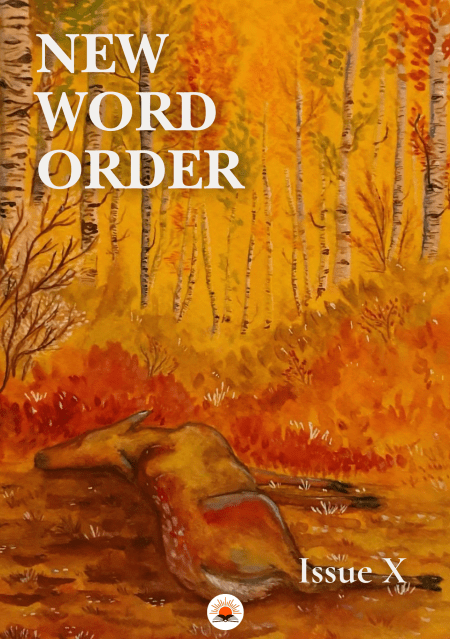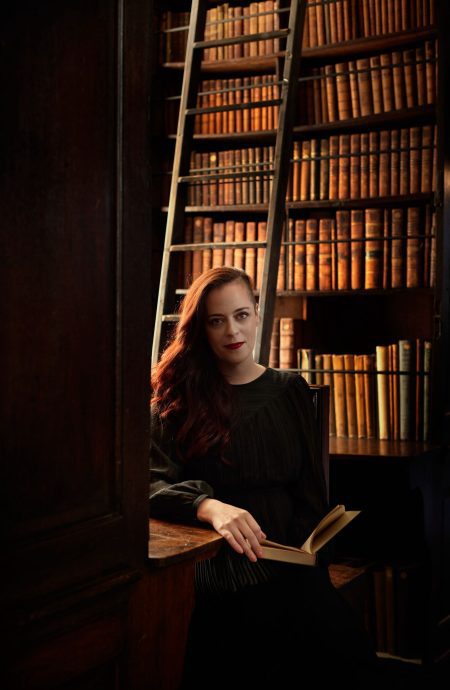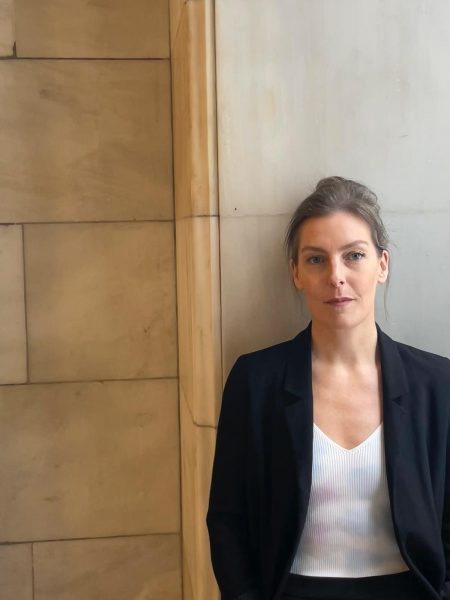Colin Barret is University College Dublin’s 2024 Writer in Residence. Having focused on short stories for the early part of his career, releasing collections Young Skins (2013) and Homesickness (2022), 2024 marks the year of his debut novel Wild Houses. Lucy Cleere, New Word Order’s issue VIII marketing director, sat down with Barret to discuss the move from short story to novel and what a day in the life of a Writer in Residence looks like.
Conducted by Lucy Cleere, edited by Ella Ruddle.
Lucy Cleere: Is there a typical day-to-day for you as a writer? Especially now being UCD’s Writer in Residence and after just publishing a novel – do you get straight back to writing? At this point are you working with anything else?
Colin Barrett: Well, I did take a little break just because I think it’s good to do that. I mean after just finishing a long project if you wake up the next day and happen to be burning with inspiration to write something else then go for it, but understandably you may be running on empty a bit creatively. So yeah I gave myself permission to take a break. Again, that’s how the imagination works anyway, you give yourself permission to switch off and then that’s when something comes along!
But actually, towards the end of drafting Wild Houses, I did have an idea for a second novel which is still very vague and obtuse. Nonetheless, I wrote a bit, like 6,000 words, a small section and some characters about 6 months before I’d finished and signed off Wild Houses. I spent a month or two finishing everything I
had to do on Wild Houses – editing, proofreading, all that technical stuff. Then with the release of the book, there’s generally not a huge amount to do. In these few weeks, I was doing a bit of promo for the book while writing pieces to really make the most of that stage of the release.
And the Writer in Residence, it’s great, I love doing it and I really do enjoy the structure I have now. I have an office now! I’ve never had an office before, so I don’t have to write on my kitchen table every day which is basically what I was doing before now so it’s nice to have that. I’m doing a lot of one-on-one stuff and
feedback sessions with people which has been quite popular. I am able to control what I want to do which has given me space to write as well.
Lucy Cleere: Any Spoilers on this new novel so far?
Colin Barrett: I mean it’s just too vague, too vague to say. It’s very early days but I mean yeah I have something there and I’m working away at it.
Lucy Cleere: In a 2023 issue of Tolka you were speaking to author Nicole Flattery about the process of writing Wild Houses and how it has differed from writing short stories; how there was an intensity to them that was ‘easier’ to manage than the novel. Having finished the process do you still feel the same? Any new revelations?
Colin Barrett: I can’t remember what I said exactly haha – just complained probably about how hard it is to write a novel. Since that conversation the book has come out – it’s been received and reviewed and all that, so you have people talking about it. I spent years just immersed in writing short stories, just thinking about that form so it was a definite switch to writing the novel. Any characters or ideas I came up with I was instinctively shaping them towards being a short story.
Lucy Cleere: So Wild Houses was originally meant to be a short story?
Colin Barrett: Well, this is the thing! It’s hard to know, I had things set up with the characters – I had this idea of this guy who was incidentally/passively involved in a kidnapping. He’s not the victim, he’s not the direct perpetrator, he’s not active in it but he’s sort of in between and doesn’t really have a choice, so that was an
interesting position to put a character in. I just thought there was something there that I could expand on. So yes, I was always consciously thinking about a novel, and when I came across an idea it was just trial and error from there. It took years to work on it; I wrote a long first draft. There was a load of stuff in it, too much stuff, and so I had to narrow it down. The second draft was just restructuring and I concentrated on getting what was there tighter and making sure it was readable and had momentum.
A long-winded way to answer your question – you just have to start thinking differently and have a different approach to characters. I’ve said this a few times, when a reader reads a short story generally they want to read it all in one go. You open it, it’s 5/10 minutes, and you start and finish them in a singular experience. After a great short story, you’re left with a lot to think about – a lot to digest but it’s a singular experience you have and that’s it. Whereas with a novel – while there are people who sit down and read a whole novel in an afternoon, you generally return to it episodically and so it’s a place you go to for a little while. That’s why I called it Wild Houses, books are houses that people go to for a couple of weeks, a few days while they are reading it so even when the material is dark it needs to welcome the reader back in some way. So yes, a short story is more intense in that way than a novel. With a novel you want your readers to develop a kind of affection for it throughout the reading period. You want them to keep coming back.
Lucy Cleere: A lot of what you have published so far has represented a very specific setting, style and genre – can you ever see yourself branching out to something completely different or do you think that as a writer you should only write what flows comfortably and naturally to you?
Colin Barrett: The latter part. I think of writing a lot as freeing myself from preconceptions. I write from the gut and I write very intuitively. I don’t have big plans or ideas in my head before I start writing anything. I write about a particular region of Ireland and a place I’m familiar with because that is what comes to me, but all the same I wouldn’t be afraid to give something else a go if it came to me. It is helpful to free yourself from preconceptions about your writing. I think people, especially starting, can end up laden with preconceptions about what you think you can write or should write. You start to wonder, have I written too much about this stuff already? This is incredibly understandable but you have to pull yourself up and even from story to story and book to book you can’t worry about the similarities. More so, I find, the more you go back over certain subject matter and themes you generally find another way of telling the story. There is more material to extract. I just do that as a matter of faith but anyway, it’s the way I write. It’s about whatever frees you up, whatever disinhibits you and allows you to write is the way to go. And to be honest you are largely writing for yourself. It takes a long time to write a book, it takes a long time to have it looked at and dissected by people who might not necessarily understand it so you have to. Writing about what you want to write about has always been my instinct.
Lucy Cleere: Your stories and novel represent a particular type of place, capturing the inertia of Western Irish life. Is there any significance behind switching from fictional to real places eg. Glanbeigh in Young Skins to Ballina in Wild Houses– if they represent the same thing?
Colin Barrett: Yeah, I know definitely with my first collection, with Young Skins, setting it in a fictional town served two purposes: the first one was just in terms of writing it because it gave it a cohesive theme, a unifying element to the collection. Certainly, when I was a young writer it helped me generate ideas. I was freed up to
write the stories that ultimately formed Young Skins.
The second thing was more of a protective tactic, haha, I didn’t feel comfortable setting it directly in where I’m from. I don’t know why because it’s transparently based on where I’m from so I’m not exactly kidding anybody. I guess when people aren’t from there it can feel sort of representative. But again, going back to the second point, you can’t worry about those things, you just have to write what you have to write. So setting it in a fictional town helped me finish those stories, and people from Mayo who read these stories at least have the sensibility to understand what you’re doing. I didn’t want people to think I was being condescending,
romanticising or overly sentimental. While it talks of inertia and the frustrations of small-town life it’s not a sociological study. Writing Young Skins I was barely older than the characters themselves but I had moved away from Mayo and writing about it felt like a way of holding onto it. That somehow I could preserve or bring
those memories closer to me.
Lucy Cleere: A lot of your works leave many open ended questions, have you ever wondered if a character or story’s resolution has been unfinished after publication?
Colin Barrett: There’s nothing that I’ve published that I consciously think about changing. I put all my energy into every story and I’m totally in that world with the characters. I think a general reaction to anyone who reads a good short story is “Oh I’d love to read more of that.” But, and I did this with the novel too, sometimes
you hit gold with a great character and you’re like I could write hundreds of pages about this person, but ultimately your highest loyalty is to the story, to try and get it as right as you can. So I put everything into it and then I leave it there. Definitely at the time, when I came close to the end of the story and was revising and revising it, sometimes it’s natural to feel – “Is there something missing?” But at a certain point, you need to say you have done the best you can with it. You make decisions when you write a story. You have your characters and a nice premise or plot, but then the logic of the story takes over. So yeah the highest loyalty is always to the story.
Lucy Cleere: A lot of your characters eg. Sketch, Gabe, Dymphna, and Tug possess a type of enraged, violent streak, how do you encapsulate that in a character? Is it any personal experience or is it all observational?
Colin Barrett: Well yes, there are often criminal or violent characters in my stories. The way I think of them all is that I grew up knowing certain characters, they weren’t necessarily drug dealers or anything, but they were people who lived in between. Probably still now, but certainly 20/30 years ago when I was a kid, there’d
be young men who were semi-employed or sometimes on the dole that lived at home with not very much money but a lot of free time. They had the freedom to disrupt because they lived a fairly circumscribed life. They were probably not particularly well educated and might not have been able to advance to middle-class
comfort or whatever one’s aspirations are but they had a relationship with the world and most of them were happy – or at least seemed so to me in my naivety. So I’ve been able to write about those sorts of people who you know are – in between things.
As for the violence of it, I don’t think you can or should go in wanting to write a violent book – I always go in wanting to keep the violence to a minimum. You want to set up dynamics between characters and know where it comes from. I have 4 younger brothers, but even as an adolescent in a small town, you end up hanging around in these slightly imbalanced age groups just because there are not that many people around. I remember being like 13 or 14 and hanging around with mostly kids my age, but for some reason, there could be a random 19-year-old or even 20, and they’d be like “Oh let’s get cans or something” and you’re like “why are we hanging out with these guys?”. You end up with these weird guys and that’s when the younger people start acting older than they are and getting into trouble. That was what was on my mind as I was writing. I mean Dev is the same age as Cillian and Gabe but still, he’s sort of unworldly because he left school, he’s almost psychologically younger or something. Doll is almost more mature than him even though he’s a kid as well, while Nicky under her circumstances has more sense than all of them.
It is about not having violence for the sake of having violence. I try to be more imaginative than that. I wanted this sense of violence and menace to permeate because of course Gabe and Sketch have kidnapped Doll but they’re kinda pretending like it’s not really a kidnapping. I wanted the reader to understand that they’ve already gone this far and if they wanted to they could maybe go further, so violence is always there in the air but I didn’t want to overdo it. I remember being in situations when I was a kid where the threat of it was awful, it loomed worse than the actual violence. So that sort of sense of implicit violence, just hanging in the air permeating, that’s what I was trying to get across, and those sort of slightly odd groups you would end up with as a kid.
Lucy Cleere: Is there any of that material that you would ever return to, say even stuff from ten years ago, would you save it and revisit?
Colin Barrett: I save everything in the hope that some piece of crap I wrote I might think “Ohh that’s actually good I’ll use that again.” You may or may not but it’s worth it, it’s easy these days to save things and keep them in files, I do. I mean with the novel, I sheared off 40,000 words basically from the first draft to the second. And that’s a lot of words! And they weren’t all bad, some just weren’t necessary, and you put all that away with the chance that you might come back to it. You don’t always but it’s worth it to keep.
Lucy Cleere: Is there anyone in the literary sphere right now that you see reflected in your work or similar, or that you would be inspired by?
Colin Barrett: I mean it’s funny actually, when I wrote my first book there were a few obvious Irish inspirations like Kevin Barry who published a collection with The Stinging Fly that probably meant a lot to me at the time. Barry just has this flare and he wasn’t afraid to go surreal. It was freeing really, knowing he did what he liked
with it. I’ve definitely read more Irish writers since he started writing stories. I was reading a lot, well I was reading all over the place when I was younger, before my first book. American writers like Louis Johnson, and Joe Williams, mainly short story writers, actually would’ve been a big influence before Young Skins.
Since that book was published a lot of Irish writers emerged so I got to know them, I got to see their first works published in The Stinging Fly or The Dublin Review, and see them come through. To me, they were just young writers I happened to know, having a drink with in the pub after we’re finished a reading or something, so that was nice, that was a really important thing to me to have this sense of community. People from other countries (England maybe – haha) don’t have that as much. Irish writers are so nice! Generally, there are no insane rivalries -they’re all nice to each other, well to an extent, but it’s true. Most of my friendships I’ve made as an adult have been mainly through this club of writers so yeah it’s really nice to have a community because writing is a very solitary profession once you’re outside of a structure whether it is college or workshops or whatever. An unrivalled thing about being based in Dublin as an Irish writer is having access to those readings and
festivals, like whatever stage you are in writing, if you’re slogging away on a manuscript, being able to be with other writers and see other writers is invaluable. And it’s the same thing here in UCD with the Writer in Residence, it’s a great privilege to be able to think about writing seriously, and have conversations with people who are just as passionate.



